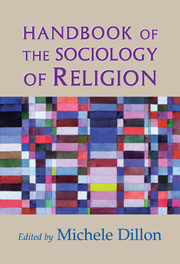Book contents
- Frontmatter
- Contents
- List of Contributors
- Acknowledgment
- Part One Religion as a Field of Sociological Knowledge
- Part Two Religion and Social Change
- Part Three Religion and the Life Course
- Part Four Religion and Social Identity
- Part Five Religion, Political Behavior, and Public Culture
- Part Six Religion and Socioeconomic Inequality
- 26 Religion, Faith-Based Community Organizing, and the Struggle for Justice
- 27 Latina Empowerment, Border Realities, and Faith-Based Organizations
- 28 “Worldly” or “Other Worldly”?
- References
- Index
28 - “Worldly” or “Other Worldly”?
Activism in an Urban Religious District
Published online by Cambridge University Press: 05 June 2012
- Frontmatter
- Contents
- List of Contributors
- Acknowledgment
- Part One Religion as a Field of Sociological Knowledge
- Part Two Religion and Social Change
- Part Three Religion and the Life Course
- Part Four Religion and Social Identity
- Part Five Religion, Political Behavior, and Public Culture
- Part Six Religion and Socioeconomic Inequality
- 26 Religion, Faith-Based Community Organizing, and the Struggle for Justice
- 27 Latina Empowerment, Border Realities, and Faith-Based Organizations
- 28 “Worldly” or “Other Worldly”?
- References
- Index
Summary
INTRODUCTION
Colloquially, the term “faith-based activism” refers to extroverted forms of social action originating in religious institutions. Churches with food pantries and shelters for battered women, or that build homes and run welfare-to-work programs, or whose leaders organize marches and protests, are considered “activist.” It is assumed that religious beliefs and practices are no obstacle for these churches – there is no contradiction between faith and activism. By contrast, churches that do apparently little for nonmembers are called “insular,” and it is assumed that these institutions face religious ideological barriers to activity in the secular world. It is tempting to call one group “worldly” and the other “otherworldly,” or one “church” and the other “sect” as have so many scholarly observers (Weber 1922/1963; Troeltsch 1931; Iannaccone 1988; Johnson 1963).
Indeed, among those ideas at the heart of the sociology of religion is the distinction between worldly and otherworldly modes of religious presence. Beneath most typologies of religious organizations is the notion that some churches are oriented toward earthly matters, while others completely turn their backs to secular human affairs, seeking solace in the promise of a better world to come. The worldly/otherworldly dichotomy is implicit especially in works attempting to sort African-American churches.
Scholars of black religion have, for instance, divided black churches into “expressive” and “instrumental.” Expressive congregations are highly insular religious enclaves whose members avoid all involvement in political and secular social matters. They value emotional catharsis above all else.
- Type
- Chapter
- Information
- Handbook of the Sociology of Religion , pp. 412 - 422Publisher: Cambridge University PressPrint publication year: 2003
- 3
- Cited by

